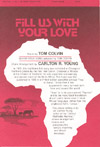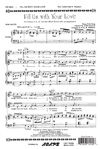- |
User Links
Jesu, Jesu, Fill Us with Your Love
Hymn Information
- First Line
- Kneels at the feet of his friends
- Author
- Tom Colvin (1963)
- Tune Name
- CHEREPONI
- Adapter
- Tom Colvin (1963)
- Arranger
- Diane Dykgraaf
- Tune Source
- Ghanian folk song
- Topic
- Church Year: Maundy Thursday · Culture, Community & Nation · Love: Our Love for Others · Race Relations · Reconciliation to Each Other · Social Justice
Copyright Information
- Text Copyright
- © 1969 Hope Publishing Company
- Tune Copyright
- Adapt. © 1969 Hope Publishing Company · Arr. © 2012 Hope Publishing Company
- Reprint/Projection Information
- Words and Music: Permitted with a license from CCLI.com or from OneLicense.net. If you do not own one of these licenses, please contact the copyright holder for permission.
Full Text
Scripture References
Further Reflections on Scripture References
This fine text is based on Jesus' personalized object lesson on servanthood when he washed his disciples' feet (John 13:1-17) and on Jesus’ parable of the good Samaritan. That parable was his response to the question “Who is my Neighbor?” (Luke 10:25-37).
Psalter Hymnal Handbook
Confessions and Statements of Faith References
Further Reflections on Confessions and Statements of Faith References
Any song or testimony about the cries that comes from our nations and cities must be met with confessional statements about the mission of the church as listed here.
Our World Belongs to God, paragraphs 41-43 are explicit and pointed about the mission of the church: “In a world estranged from God, where happiness and peace are offered in many names and millions face confusing choices, we witness—with respect for followers of other ways—to the only one in whose name salvation is found: Jesus Christ.”
Later, Our World Belongs to God, paragraphs 52-54 point to the task of the church in seeking public justice and functioning as a peacemaker: “We call on our governments to work for peace and to restore just relationships. We deplore the spread of weapons in our world and on our streets with the risks they bring and the horrors they threaten…”
The Belhar Confession, section 3 calls the church to be a peacemaker, and section 4 calls the church “to bring about justice and true peace.”
Our Song of Hope, stanza 10 calls the church to seek “the welfare of the people” and to work “against inhuman oppression of humanity.”
Jesu, Jesu, Fill Us with Your Love
Tune Information
- Name
- CHEREPONI
- Key
- E♭ Major
- Meter
- 7.7.9 refrain 9.12


 My Starred Hymns
My Starred Hymns






